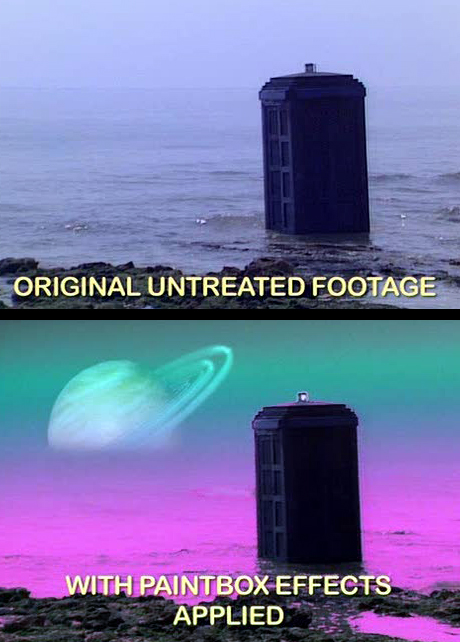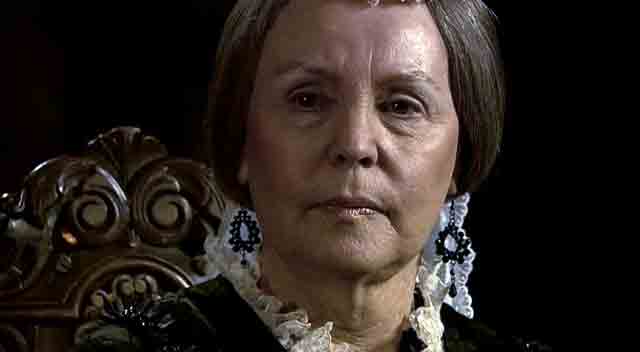Transmat:Doctor Who
The Ark in Space was the second story of Season 12 of Doctor Who. It was the Fourth Doctor's first full, post-regenerative story. It proceeded from a mild-cliffhanger at the end of Robot, showing what happened after Harry Sullivan climbed into the police box in UNIT's laboratory. It importantly established the location of Nerva Beacon, which would be the narrative lynchpin of the season.
Ark had a somewhat tortuous scripting process, having slipped past two writers before its scripts were finally accepted. Both Christopher Langley and John Lucarotti tried and failed to write a script about a space station for season 12. Of the two, Lucarotti came closest. However, because he then lived on a boat anchored in the Mediterranean — and there was a postal strike afflicting Corsica — Lucarotti was essentially incommunicado to script editor Robert Holmes. It was impossible for Holmes to conduct timely consultation with the Doctor Who veteran. Lucarotti was paid fully for his work, and Holmes undertook a page one rewrite, retaining only the central conceit of Lucarotti's tale.
Despite its difficult birth, the story won kudos from the BBC Wales production staff. Russell T Davies once called Ark his favourite storyline of the 1963 version of Doctor Who. Steven Moffat considered it the best Fourth Doctor story, while Barnaby Edwards confessed to being "petrified of the Wirrn" as a child. Tom Baker himself has also stated that, of all the stories he'd filmed, The Ark in Space was his favourite.
Think Doctor Who is just for boys? Don't you believe it. Not only was the show's very first producer a woman, but it would never have come back without the fierce advocacy of Jane Tranter and Julie Gardner. Considering her importance to Doctor Who it's somewhat ironic that Tranter's only on-screen credits are for Torchwood: Miracle Day. But Gardner, her "partner in crime", is tied only with Russell T Davies as the most prolific producer in Doctor Who history.
The careers of the Fifth, Sixth, Seventh and Eighth Doctors are significantly longer in audio than on television. Check out their latest works at category:2024 audio stories
Officially, only The Lodger has been explicitly adapted from a comic strip — also called The Lodger.
However, several stories have clearly taken material from comic strips — often those in Doctor Who Magazine. The Shakespeare Code contains a good amount of material from A Groatsworth of Wit, and the notion of the Doctor absorbing the time vortex in order to spare a companion was explored in both The Parting of the Ways and The Flood.
Donald Baverstock was the BBC executive who set the the wheels in motion that eventually led to the creation of Doctor Who. Essentially the original commissioner of the programme, he hired Sydney Newman and later imposed a sense of financial responsibility upon producer Verity Lambert.
But Baverstock wasn't the only BBC executive to have a profound impact on the development of Doctor Who. Make sure you read about Lorraine Heggessey, Mark Thompson, Danny Cohen, George Entwistle, Tony Hall, Shaun Sutton, Sydney Newman and others.- 1965 - Part three of the TV Comic story Enter: The Go-Ray was published.
- 1969 - Part one of the TV Comic story The Night Walkers was published.
- 1975
- Part three of Pyramids of Mars premiered on BBC1.
- Part three of the TV Comic story The Space Ghost was published.
- 1979 - DWM 5 was published by Marvel Comics.
- 1980 - Part three of Full Circle premiered on BBC1.
- 1984 - DWM 95 was published by Marvel Comics.
- 1986 - Part two of Terror of the Vervoids premiered on BBC1.
- 1989 - Part three of The Curse of Fenric premiered on BBC1.
- 2005 - The Claws of Axos was released on Region 1 DVD.
- 2007 - DWA 42 was published by BBC Magazines.
- 2010
- Part one of Lost in Time premiered on CBBC, followed by episode five of Sarah Jane's Alien Files.
- Doctor Who: The Complete Fifth Series was released in the UK on DVD and Blu-ray.
- 2011 - The Witch from the Well and The First Wave were released by Big Finish Productions.
- 2012 - DWA 294 was published by Immediate Media Company London Limited.
- 2014 - Death in Heaven premiered on BBC One.
- 2018 - Molten Heart was published by BBC Books.
- 2022
- Sullivan and Cross - AWOL was released by Big Finish.
- A World of Demons: The Villains of Doctor Who was released.
- 2023 - Mission: Find Lilith was released by BBV Productions.
- ,.. that Ben Aaronovitch believes the UNIT dating controversy is insoluble by any retcon? (DOC: The UNIT Dating Conundrum)
- ... that Professor Saurian is a dinosaur-like sentient whom the Eleventh Doctor and Amy Pond have met in several Doctor Who Adventures stories? (COMIC: Extinction Event, Dinosaurs in New York! and Dino World)
- ... that the name "Chumbley" was invented by Vicki, and wasn't, in fact, the proper name of the robots? (TV: Galaxy 4)
- ... that Dragonfire establishes Ace to be 16 years old, a full decade younger than her actor, Sophie Aldred?
- ... that snegs are salamanders which are used at the basis of a chicken curry-eqsue stew served on Sirius Two? (PROSE: Island of Death)
- 1927
- 1937 - Actor Malcolm Taylor was born.[3]
- 1941 - Actor Nerys Hughes was born.[4]
- 1942 - Actor Su Douglas was born.[5]
- 1956 - Writer Richard Curtis was born.[6][7]
- 1958 - Actor John Gillett was born.[8]
- 1983 - Actor Chris Rankin was born.[9]
- 1984 - Director, writer and actor Scott Handcock was born.[10]
- 1992 - Actor Zaqi Ismail was born.[11]
- 2012 - Actor Roger Hammond died.[12]
- 2021 - Studio sound supervisor Hugh Barker died.[13]
- 1963 - The studio recording for "The Firemaker" took place at Studio D of Lime Grove Studios. (INFO: "The Firemaker")
- 1967 - Location filming at Climping Beach for The Enemy of the World concluded. (TCH 11)
- 1968 - Episode eight of The Invasion was recorded at Lime Grove Studios D. (TCH 13)
- 1972 - Location filming The Three Doctors took place. (REF: Doctor Who The Handbook: The Third Doctor)
- 1977 - Studio filming for The Invasion of Time took place at BBC Television Centre studio 8. (REF: Doctor Who The Handbook: The Fourth Doctor)
- 2005
- Rewrites for The Christmas Invasion known as "salmon script revisions" were made. This changed Guinevere One's television coverage, Daniel Llewellyn arriving at the Tower of London and the A-positive people being returned to normal. (DWMSE 14)
- Big Finish's audio adaptation of the unproduced TV story Night Thoughts was recorded at the Moat Studios.
- 2011 - The Big Finish audio story The Emerald Tiger was recorded at the Moat Studios.
- 2016 - Big Finish's audio anthology The Third Doctor Adventures: Volume Three took place at the Soundhouse.
- 2017
- The Big Finish audio story The Lure of the Nomad was recorded at the Moat Studios.
- Big Finish announced the fourth series of The Third Doctor Adventures.
- 2018 - The Big Finish audio story The Moons of Vulpana was recorded at the Moat Studios.
- 2019 - Big Finish's The Paternoster Gang audio anthology Heritage 4 was recorded.
- 2022 - Big Finish's audio anthology Comrades-in-Arms was recorded at the Soundhouse.
- ↑ Doctor Who Guide
- ↑ Ken Dodd: The Biography
- ↑ Aveleyman
- ↑ BFI
- ↑ Aveleyman
- ↑ Richard Curtis. Contactmusic.com. Retrieved on 10 March 2017.
- ↑ Roberts, Jem. The True History of the Blackadder. London: Arrow Books, 2013. Print.
- ↑ Aveleyman
- ↑ People Pill
- ↑ People Pill
- ↑ IMDb
- ↑ The Guardian
- ↑ DWM 572




